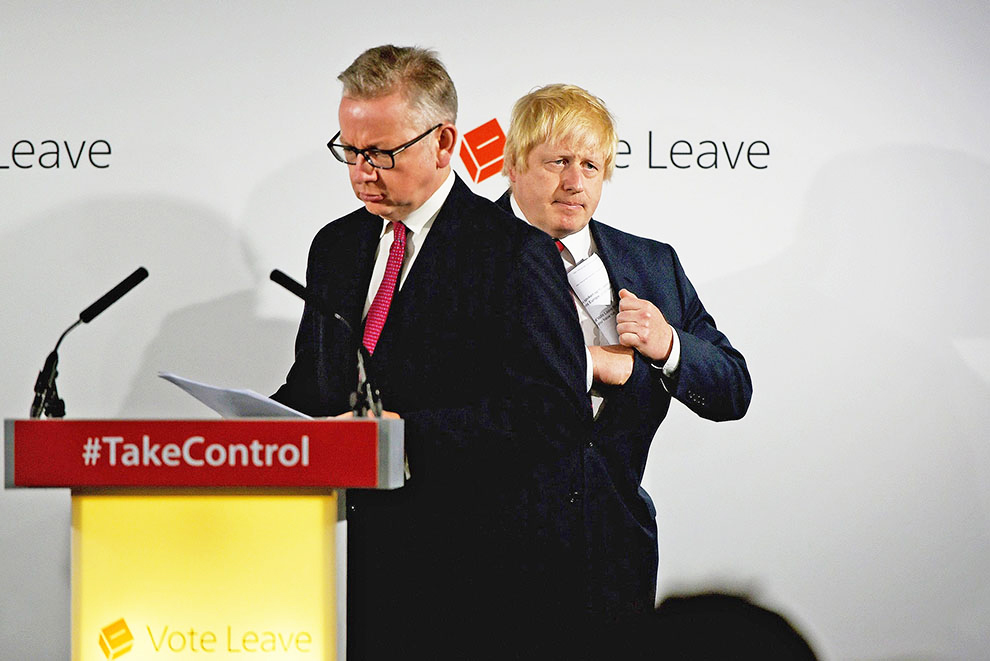It was not supposed to be like this: a Britain still sharply divided about its membership of the European Union three years after the June 2016 referendum delivered a remain victory of 52 per cent. Then, the bleary early-hours judgement was that the country’s EU status was now guaranteed for the next decade. As with Scotland’s 55–45 vote against independence in 2014, precious continuity had been secured, Britain’s instinct for stability confirmed — and prime minister David Cameron’s place in history triple-locked.
By dawn, though, the doubts were setting in, fuelled by the vote’s closeness and its fearful segregations of age, social geography and nation (Scotland and Northern Ireland’s clear Yes to the European Union neutering England and Wales’s slim No). Cameron’s strained bonhomie at 7am outside 10 Downing Street (“Unity at home will secure our influence in Europe. Let’s go to it!”) felt as off as his invocation of the English question on the same spot two years before, which had galvanised support for the pro-independence Scottish National Party.
The morning scrum instantly switched to the Brexit campaign’s rival figureheads, each notably upbeat: first the UKIP leader Nigel Farage, bellowing exultancy (“Britons will not long be denied our freedom!”), then Cameron’s erstwhile Conservative Party colleagues Boris Johnson and Michael Gove, sprinkling emollience with cod-Churchillian gravitas (“We respect and accept the verdict. But for our vision of a new Britain, this is but the end of the beginning!”). In a striking mood again reminiscent of Scotland, the losers were behaving like winners, and vice versa.
By lunchtime on the 24/7 media carousel, the referendum was being treated more as the latest skirmish in Britain’s decades-old European argument than as any sort of conclusion to it. Anti-EU voices were all over the airwaves, saying the verdict was skewed by the remain side’s huge funding lead, rock-solid establishment backing and (after a turnout of 72 per cent in the UK’s non-mandatory voting system) support of just 38 per cent of the total electorate. An English drumbeat — we voted out, the Scots are keeping us in — thudded across phone-in land. It all felt very much like day one of a hard-edged new effort.
The long campaign had itself been nasty. Leavers’ slogans, notably “take back control,” had played to populist and anti-immigration sentiment, whereas the pro-EU camp, welding status quo reassurance to pocketbook alarmism, exuded complacency. A nadir was the brutal murder of a Labour member of parliament, Jo Cox, by a constituent (soon revealed to be a Neo-Nazi) shouting “Britain first!” The collective intake of breath proved all too brief, although some held that the atrocity, a week before the vote, may have stalled the Brexit momentum.
In any event, the referendum’s aftermath brought no sign of a let-up in the scars it had opened, or revealed. Cameron had pleaded for a healing process. Instead, voters’ in–out alignments hardened, to the extent of overtaking the Conservative–Labour split in numbers and valence. More broadly, the event capped social media’s remaking of the political realm in its own image, as a machine for turning citizens into tribalists.
The post-referendum mood soon turned vengeful. As the “hollow victory” headlines stuck to Cameron, his authority frayed. Personal tensions in his government now complicated policy ones. Only a year after unexpected election success had freed the Conservatives from unhappy partnership with the Liberal Democrats, every disagreement was evidence of a second “coalition of chaos.” Cameron, long derided as a lightweight, “essay-crisis” premier who outsourced strategy to his wily chancellor George Osborne, got no credit for his premiership’s 2014–16 hat-trick.
Nor were mitigating factors in the pallid “yes” to Europe much cited. One was the lack of a strong Labour effort, thanks partly to the absence of Jeremy Corbyn from the hustings, Labour’s leader being a lifelong (if now coded) EU opponent. Another was the low-energy contribution of Scottish, Welsh and Irish nationalist parties, their leaders reluctant to stand alongside despised adversaries — Cameron, Tories, the UK itself — in any cause. In the event they saved Britain’s position in the EU while accentuating English exceptionalism: a double win.
With surprising suddenness, Cameron looked not just unpopular — he had often been that — but out of time. The smooth operator stood down at the Conservatives’ September conference with a rueful, acclaimed valedictory (hypocrisy still the Tories’ secret weapon) quoting Wellington: “Nothing except a battle lost can be half so melancholy as a battle won.” Regime change inevitably embroiled Osborne, his closest ally, whose apocalyptic warnings of Brexit’s economic impact had earned him particular enmity among leavers.
A pro-Brexit successor was inevitable: inside the Conservative Party as outside, the anti-EU virus was merrily circulating in the very teeth of a process designed to eradicate it. After an operatic leadership campaign, Gove and Johnson formed the new axis of power in party and cabinet. Their improvised pact — echoing Tony Blair and Gordon Brown’s, this time sealed in Paddington not Islington — envisioned a medium-term shift to a “post-EU” Britain via a ramshackle menu of education and localism, greenery and globalism, trade-centred Anglosphere-ism and Asia-ism.
The mishmash was driven by aptitude more than policy: the punctilious, cerebral Gove, adopted son of an Aberdeen couple, driven by ideas but open to persuasive new ones; and the carefully shambolic Johnson, a self-promoting crowd-pleaser of high schooling and undimmed ambition (who nonetheless, the top job on hold, embraced with gusto his newly minted responsibility for “London and the UK”).
Beyond formally reopening the Brexit file, their serendipitous alliance lacked a modernising core of the kind that had animated Cameron’s decade. Most in the pro-EU professional classes, and many in their own government, were hostile. But in two ways Gove, Johnson and the team around them were lucky.
The first was the Labour opposition, transformed by Corbyn into both a mass party and a sect, impervious to events, plagued by feverish disputes of its own, and continuing to trundle several points behind the Tories even during the latter’s leadership convulsions. The second was the EU itself, whose economic troubles, advancing populisms, political divisions, security weaknesses, and strategic paralysis were becoming unavoidable — and being prominently reported — in the wake of the UK’s choice to stay a member.
All this proved, if hardly yet a strategic opportunity for the “Govement,” at least a messaging one. With predictable cussedness, Brits’ default scepticism about the EU had returned to normal after the referendum. Little appetite existed for a fresh in–out vote. But amid mounting domestic pressures, fierce Europhile criticism, and the Faragist right’s zealotry, Gove’s agile poking of the EU’s flaws had, over the next couple of years, evergreen political utility.
Yet there were downsides for a government with economic priorities and a preference for a longer Brexit game. The referendum’s toxic potions had long brewed into furious fixity, its sides equally absolutist in temperament and vehement in language. Brexiteers, excited by their nearness to nirvana, were bent on an early rerun of the vote; Remainers, appalled at their proximity to the abyss, sought ways of eliminating the risk of an EU departure by constitutional means. Even for those in power there was no immunity from the fervour. Indeed, most were plugged in.
By 2019, a year before a general election is due, British politics is still defined by the 2016 referendum. It entrenched the country’s polarisation along new lines that overrode, if not fully eclipsed, traditional party ones. It accelerated the now insistently febrile cast of Britain’s political life, enabled by social media but itself enabling nothing. And far from answering the UK–EU question “once and for all,” as everyone involved said at the time, it supercharged the question for another electoral cycle at least.
Brexit advocates, encouraged by consistent if small poll leads of around 55 to 45 per cent, are now pressing for a new referendum. Remainers, veering between worry and fury, are building funds and databases. The momentum for a rematch in 2020, perhaps on the same day as the election itself, is growing.
So unfolds one of the zillion-and-one futures that didn’t happen in 2016–19, though it still seems almost more plausible than the future that did — that is — happening: Britain’s political self-implosion, chiefly owed to the staggering ineptitude of Theresa May, though with many others’ complicity. In a strict sense, the UK state’s failure over Brexit is far greater than over Suez, Bloody Sunday, Iraq, Grenfell and Windrush, without diminishing any of these dark episodes of the past seven decades.
This all-consuming three-year quagmire is desolating enough. Yet the above trip down fantasy lane also cautions that, with a near-exact reversal of the 2016 result, Britain’s schism over the EU would have deepened in much the same way. Why so? Because the referendum allowed the schism to become the lead driver of British politics. The campaign sharpened it, the close result solidified it, and the zero policy outcome incentivised it. With a remain choice, Europe’s inescapable crises would have done the same trick.
It’s worth noting that such bitter division represents departure more than continuity in the UK’s history with the European Union, whose main feature was ambivalence: a “living together, apart.” Lukewarm support for membership and underlying suspicion of the body long coexisted, within as well as between people. The ardent on either side, whether professional Europeanists or national populists, were always a minority, though their voices tended to eclipse the noncommittal majority.
In contrast to founders France and Germany, neighbouring Ireland, or ex-communist states such as Latvia and Poland, the stand-offish Brits (especially English) forever saw the EU in transactional rather than existential terms. Encased in their island fortress, conscious of bonds with more distant lands, and holding to a still-potent idea (if often forlorn in practice) of freedom of action, their relationship to the EU was doomed to half-heartedness. The job of British politicians was to use this rooted ambiguity about Europe as a means of curating Britain’s interests, and on the whole they did pretty well.
The referendum, with its newly stark choice, made the balancing act harder. Fervour was in, nuance out. Here, Scotland’s independence vote of 2014 offered a lurid preview of the Brexit one. Both took place as social media was extending its colonisation of politics and journalism. Many in the political class had scrambled on board, embracing a competitive extremism of attitude in search of media share, routinely hyperbolic language, and self-dramatising emotional display. There was, is, no way back.
Brexit’s morass now creeps towards a denouement. Its latest stage began on 29 March, long planned as the UK’s farewell from the EU, when instead the House of Commons for a third time rejected the withdrawal deal agreed with Brussels. This gave various cross-party groups of MPs a second chance to seize the legislative agenda and win acceptance for their own preferred options. On 1 April, they lost four more motions, amounting to twelve so far. Representative, plebiscitary and executive democracy tussle for priority, while the verbose Commons speaker, John Bercow, is nakedly partisan. The next big date, 12 April, might see a long extension of UK membership — or a France-led guillotine. Queen Elizabeth is, for now, above it all.
Without the vacuum at the heart of government, the engines of fracture might have been contained. Now it is too late. Everywhere, division is in charge. The UK is a failing state. Its descent continues, there is no simple fix, and all are losers. •





